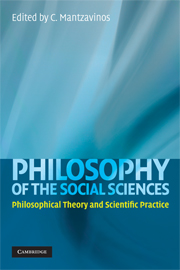Book contents
- Frontmatter
- Contents
- List of Contributors
- Acknowledgements
- Introduction
- Part I Basic Problems of Sociality
- Part II Laws and Explanation in the Social Sciences
- 4 Physicalism and the Human Sciences
- Comment
- 5 Complexity and Explanation in the Social Sciences
- Comment
- 6 The Heterogeneous Social: New Thinking About the Foundations of the Social Sciences
- Comment
- 7 What Is This Thing Called “Efficacy”?
- Comment
- Part III How Philosophy and the Social Sciences Can Enrich Each Other: Three Examples
- Epilogue
- Name Index
- Subject Index
- References
Comment
Causal Mechanisms and Generalizations
Published online by Cambridge University Press: 05 June 2012
- Frontmatter
- Contents
- List of Contributors
- Acknowledgements
- Introduction
- Part I Basic Problems of Sociality
- Part II Laws and Explanation in the Social Sciences
- 4 Physicalism and the Human Sciences
- Comment
- 5 Complexity and Explanation in the Social Sciences
- Comment
- 6 The Heterogeneous Social: New Thinking About the Foundations of the Social Sciences
- Comment
- 7 What Is This Thing Called “Efficacy”?
- Comment
- Part III How Philosophy and the Social Sciences Can Enrich Each Other: Three Examples
- Epilogue
- Name Index
- Subject Index
- References
Summary
In his provocative chapter Daniel Little sets out to address an important set of questions about the ability of the social sciences to explain contemporary social change. In doing so he raises some important challenges to the dominant approaches in the social sciences today. Much of what he proposes, both as critique and as recommended reform, is thoughtful and persuasive. However, in this brief response I want to raise an important question about his new “post-positivist” alternative.
Little characterizes social change in the following ways: “momentous and globally unprecedented,” “complex and large,” with causal connections that “are obscure,” and effects that “are large and unpredictable.” He argues that it is thus a mistake to think that it is possible to create comprehensive social theories to explain such change. In support of this he emphasizes that “social development is a contingent, multi-threaded social fabric” that involves “unpredictable twists and turns” and “myriad … contingent and variegated forms of social processes.”
This characterization of social change seems about right. As I see it, Little has accurately highlighted the complex nature of the trajectory of modern social development and change. And so, like many other contemporary scholars, Little cautions us against embarking on a fool's venture down the path of comprehensive theory-building. This debate about the relative merits of comprehensive vs partial theories of social history is an ongoing one.
- Type
- Chapter
- Information
- Philosophy of the Social SciencesPhilosophical Theory and Scientific Practice, pp. 179 - 184Publisher: Cambridge University PressPrint publication year: 2009



